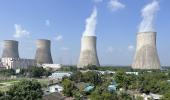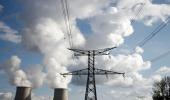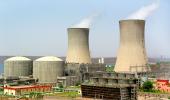'Bharat Small Reactors are essentially similar to the existing 220 MWe Pressurised Heavy Water Reactors. The existing regulations are applicable for BSRs.'

A view of India's first indigenously developed 700-megawatt electric nuclear power reactor that has been established at the Kakrapar Atomic Power Station in Gujarat. Photograph: ANI Photo
India's proposed Bharat Small Reactors (BSR) will not require any new safety norms and regulations as the existing regulations would apply for them, said a top official of the Atomic Energy Regulatory Board (AERB).
On the aspect of harmonisation of regulations for small modular reactors which global nuclear experts are now deliberating, he added based on the technology specific aspects there can be specific variations.
Formulating uniform regulatory norms considering different aspects like national priorities, public perception and others are challenging factors to come to a consensus at the global forums, he said.
"Bharat Small Reactors are essentially similar to the existing 220 MWe operating Pressurised Heavy Water Reactors (PHWR). The existing regulations are applicable for BSRs," says AERB Chairman Dinesh Kumar Shukla.
The Nuclear Power Corporation of India Ltd has 14 220MW PHWRs spread across different locations. All these units have good safety records.
Indian nuclear power experts had said the 220MW PHWR, though small in power capacity, is not a modular reactor.
Small modular reactors are the ones which are factory-made compact with less than 300 MW capacity -- generally one third of the traditional reactor's capacity.
The government has announced its decision to partner with the private sector for research and development of Bharat Small Modular Reactors.
On the issue of having uniform regulations for small modular reactors across the global industry and its need, AERB Chairman Shukla says, "Regulatory norms are established keeping in view the primary objective of protection of people and environment."
"The overarching higher level norms are the same. However, keeping in view the technology specific aspects there can be specific variations." adds Shukla.
The global nuclear power industry is moving towards small modular reactors and several types of such reactors are under development, there is also a need for uniformity in regulatory norms for faster deployment.
The International Atomic Energy Agency (IAEA) is also keen on developing uniform safety norms for SMRs.
According to IAEA, there are over 80 SMR designs at different stages of development globally.
Queried about the challenges in coming out with uniform regulatory norms, Shukla says: "National priorities, tolerability of risk and social and economic conditions are different. Public perceptions and acceptance of nuclear risk are also different. Formulating uniform regulatory norms considering these differences poses challenges to arrive at consensus at global forums."
According to the IAEA Russia and China are operating SMRs and other countries are preparing for their commissioning. Some of them are undergoing pre-licensing or licensing reviews, while others completed these steps and have entered or are expected to enter commercial operation in this decade.
A larger deployment of different types of SMRs, including microreactors, is expected in 2030 and beyond, IAEA said.
Feature Presentation: Ashish Narsale/Rediff.com











 © 2025
© 2025